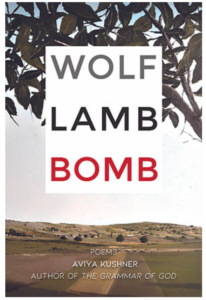 I just finished Aviya Kushner’s new book of poetry Wolf Lamb Bomb (Orison Books, 2021). I was so taken with her book The Grammar of God: A Journey into the Words and Worlds of the Bible (Spiegel & Grau / Penguin Random House, 2015) that I pre-ordered her book back in January. The Grammar of God is a book about her relationship to Hebrew and the scriptures while living in a country with a long history of translations of the scriptures read by non-Hebrew reading people. As convoluted as I made that sentence, The Grammar of God demonstrates Kushner’s love of language at every turn, so I was very excited by this book of poetry. I have written previously on The Grammar of God on my education blog Brainstorm in Progress.
I just finished Aviya Kushner’s new book of poetry Wolf Lamb Bomb (Orison Books, 2021). I was so taken with her book The Grammar of God: A Journey into the Words and Worlds of the Bible (Spiegel & Grau / Penguin Random House, 2015) that I pre-ordered her book back in January. The Grammar of God is a book about her relationship to Hebrew and the scriptures while living in a country with a long history of translations of the scriptures read by non-Hebrew reading people. As convoluted as I made that sentence, The Grammar of God demonstrates Kushner’s love of language at every turn, so I was very excited by this book of poetry. I have written previously on The Grammar of God on my education blog Brainstorm in Progress.
I read Wolf Lamb Bomb as a poetic response to 9/11, the rise of anti-Semitism, and the current violence in Israel. It is a very contemporary book, but unfortunately, this book could be situated in nearly any generation. It faces big issues through an intimate conversation between the poet and the prophet. The whole book is a gem, I read it in one sitting, which is not how I do things: I am more of a ruminator. It is 68 pages with notes linking poems and lines back to Isaiah at the end.
For myself, there is so much packed into this little book – which is one of the purposes of poetry. It gives you everything that the headlines have to leave out. I particularly liked the poem “Shard” because throughout reading the book, I felt like this poem really brought the poet and the prophet together. The poem “Ancient Hebrew” is a funny look at language and how changing one letter affords multiple meanings, and it is a look back at her book The Grammar of God.
All while I was reading her book, I kept going back in my mind to the book of Isaiah and how much influence the book has had on poetry: in my own reading in English Lit, I have Milton, Matthew Arnold (esp. his criticism), Whitman, Yeats, T.S. Eliot and on up through Allen Ginsberg and Bob Dylan. I am sure there are many more connections.
And here’s how I judge art: art is good art if it leads you back to great art or inspires its creation. So yes, I have to go back and read the Book of Isaiah again. But it is not that simple! What translation? At 60, do I finally break down and learn to read Hebrew? I am still working on English, and I was born speaking English! If you want to know what non-Hebrew readers are up against, just read the “Lilith” article in Wikipedia: the variations in translation and mistranslation are staggering. Fortunately, Kushner’s Grammar of God has some recommendations!

